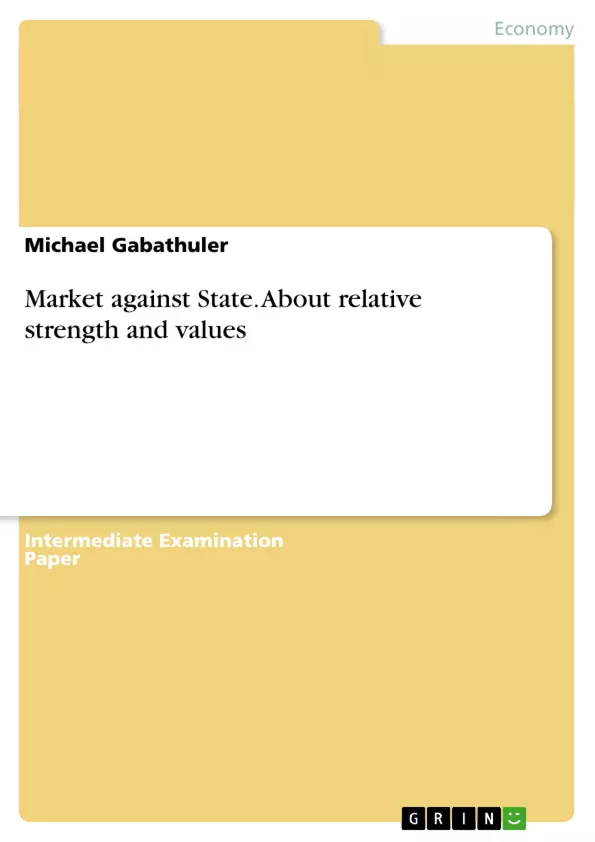In this review, I discuss the texts of Rothschild (2001), Stiglitz (2002), Judt (2010) and Bakker/Miller (1996) which deal with economic thinking in the broadest sense, and the role of market and state in particular. This review starts with the question what the intention of the different theoretical paradigms in economic thinking is. The three schools of economy, i.e. the neoclassical, Keynesian and political economy, follow diverse paradigms in order to explain the conditions under which markets work well and under which they do not. On the one hand, the three paradigms agree that the governments have a role in creating a framework for the economy. On the other hand, they disagree on the precise role of the state and the values that shape our opinion (see Stiglitz 2002: 219).
Inhaltsverzeichnis (Table of Contents)
- Economic theory - are we driven into the arms of relativism?
- The complexity and interrelation of (the globalized) reality
- The future role of the State - stability and equality versus freedom
- The future form of State - there are alternatives
Zielsetzung und Themenschwerpunkte (Objectives and Key Themes)
This review examines the role of the market and the state in economic thinking. It analyzes different theoretical paradigms, including neoclassical, Keynesian, and political economy, to understand their perspectives on market functioning and the appropriate role of government. The review explores the complexities of globalization, including its benefits and drawbacks, and the need for government intervention to address inequality and ensure social justice. It also discusses the future role of the state in a globalized world, emphasizing the tension between stability and freedom, and explores alternative models of state organization that promote greater democratic participation.- The role of the state in economic development
- The limitations of market forces
- The challenges of globalization
- The importance of social justice
- The need for democratic governance
Zusammenfassung der Kapitel (Chapter Summaries)
Economic theory - are we driven into the arms of relativism?
This chapter examines the debate between different economic paradigms and the potential for relativism in economic thinking. It analyzes the case of the US federal budget surplus in the 1990s, illustrating how different theoretical approaches can lead to different interpretations of the same economic phenomenon. The chapter argues for the importance of considering the political context when analyzing economic processes, suggesting that a political economics perspective may be more appropriate for understanding budget surpluses than a purely neoclassical approach.The complexity and interrelation of (the globalized) reality
This chapter focuses on the complexities of globalization and the need for active government intervention to manage its consequences. It analyzes the arguments of Joseph Stiglitz, who emphasizes the importance of social justice and the need for a strong state to address market failures. The chapter highlights the interconnectedness of economic performance, social cohesion, and environmental sustainability in a globalized world, arguing that collective action is essential for achieving a more inclusive and equitable future.The future role of the State - stability and equality versus freedom
This chapter discusses the future role of the state in a globalized world, drawing on the arguments of Tony Judt. Judt criticizes the destructive forces of market competition and argues for a strong state to address the issues of inequality and economic instability. He questions the effectiveness of privatization and suggests that a stable authoritarian regime may be preferable to a failing democratic state. This chapter also considers the implications of Judt's argument for the future of democracy and explores the tension between individual freedom and collective well-being.The future form of State - there are alternatives
This chapter explores alternative models of state organization, focusing on the work of Bakker and Miller. They present the "liberal alternative state" and the "democratic alternative state" as potential models for responding to the challenges of globalization. This chapter argues that future state models should prioritize decentralization, flexibility, and greater democratic participation. It also examines the influence of technological changes on state functions and the need for adaptive governance structures.Schlüsselwörter (Keywords)
This review focuses on the relationship between the market and the state, examining various economic paradigms, including neoclassical economics, Keynesian economics, and political economics. It analyzes the challenges of globalization, the need for social justice, and the future role of the state in a globalized world. Key concepts include market failures, government intervention, social cohesion, economic stability, and democratic governance.Frequently Asked Questions
What is the main focus of this economic review?
The review examines the relationship between the market and the state, specifically analyzing neoclassical, Keynesian, and political economy paradigms.
Which authors' works are discussed in this review?
The text discusses works by Rothschild (2001), Joseph Stiglitz (2002), Tony Judt (2010), and Bakker/Miller (1996).
How does Joseph Stiglitz view the role of the state?
Stiglitz emphasizes the need for a strong state to address market failures and promote social justice in a globalized world.
What are the "alternative state" models mentioned?
Bakker and Miller present the "liberal alternative state" and the "democratic alternative state" as models that prioritize decentralization and democratic participation.
What is Tony Judt's critique of market competition?
Judt criticizes the destructive nature of market competition and argues that a strong state is necessary for economic stability and reducing inequality.
What is the central tension discussed regarding the future role of the state?
The review explores the tension between individual freedom and the need for collective well-being and stability through government intervention.
- Arbeit zitieren
- Master of Art Michael Gabathuler (Autor:in), 2013, Market against State. About relative strength and values, München, GRIN Verlag, https://www.grin.com/document/268844



